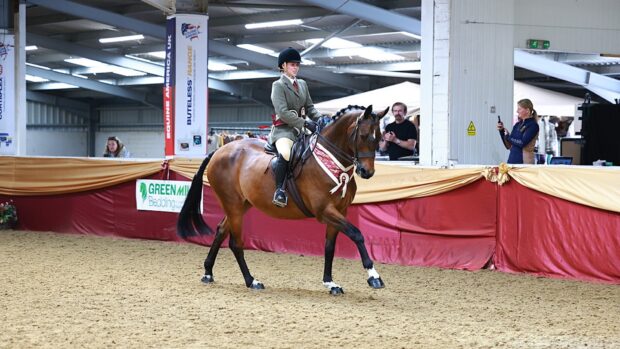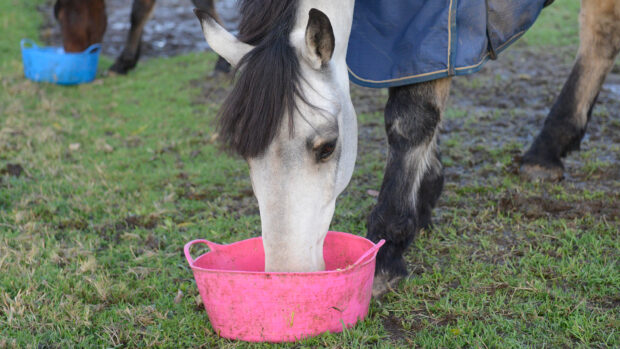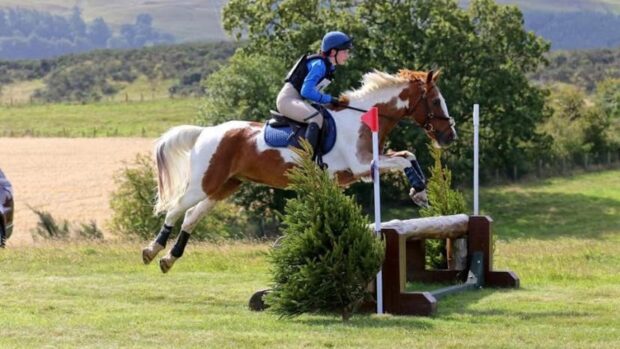Horses, like people, age at different rates, and we are all living longer. As horses get older they will undergo the normal degenerative changes that occur in the body’s systems when the heart, lungs, liver etc can no longer function at peak efficiency.
Muscular system
One of the most noticeable changes associated with equine aging is that muscle easily becomes replaced by fat. The muscles can be kept toned and circulation improved through gentle exercise.
Regular light work for the older horse, ideally including steady exercise up and down hills, combined with turn out in company every day, will help the horse’s general health and wellbeing.
The horse’s diet should include a good level of protein, which is essential for muscle and cell renewal. Hay is usually low in protein, so it is important that your horse receives sufficient quantities in hard feed. Good sources of protein include alfalfa-based chaff and some haylages, as well as compounds feeds specifically formulated for veteran horses.
Nervous system
The central nervous system needs minerals to function properly so check that your choice of feed is fulfilling the needs of your older horse. It is important that the health of the sympathetic nervous system is maintained as the system becomes less efficient with age, which means the horse is less able to control its body temperature.
If you are concerned your horse’s diet may be deficient in vitamins and minerals you should feed a broad specification vitamin and mineral supplement.
Skeletal system
Degenerative joint disease is common in former performance horses. There is a range of mobility supplements available, which can help with the discomfort. Feeding two tablespoons of soya oil daily may also help.
Vitamin D and calcium are both essential for bone remodelling, but hay and straight cereals are low in calcium. An alfalfa-based chaff is a good source of digestible calcium.
Respiratory system
Old horses tend to cough more than younger horses, which is probably because they have been exposed to dust throughout their life. Soaking hay for half an hour can help to minimise problems. Soaking for longer periods will result in a drop in the nutritional value of the forage, while less than half an hour will not give fungal spores time to expand. Many owners use herbal nutritional supplements, alongside minimising the dust in their horse’s environment, to great effect.
Digestive system
One of the main reasons older horses start to lose weight is because of their inability to chew fibre properly due to poor dentition. If your horse is unable to eat hay due to his advancing years, his fibre should be provided through a hay replacer, which is fed alongside hard feed.
Tips for elderly equines
- Regular light exercise
- Regular flu and tetanus jabs
- Regular worming programme
- Six monthly dental check by vet or qualified equine dental technician
- Adequate fibre intake – it is essential for the digestive system and it gives internal warmth
- Diet of high fibre, oil, protein, vitamins and minerals.
- Adequate shelter and appropriate rugs
- Annual veterinary MOT to check for “old horse” syndromes such as Cushings disease
|
What to feed: Older horses
There are a number of products that can be incorporated into your older horse’s diet but each horse should be treated as an individual, so ask advice from your vet and a nutritionist. Dodson & Horrell products which are suitable for older horses include: Sixteen Plus, Surelimb, Mobility, Devil’s Claw Root and Breathe Free. For further information and friendly feeding advice call the Dodson & Horrell Feed Helpline (tel: 0870 442 3322) Normal national call rates apply, or visit: www.dodsonandhorrell.com |



